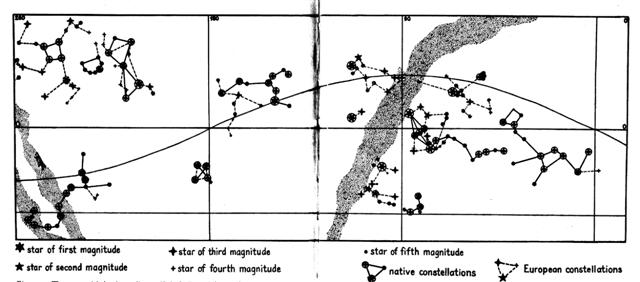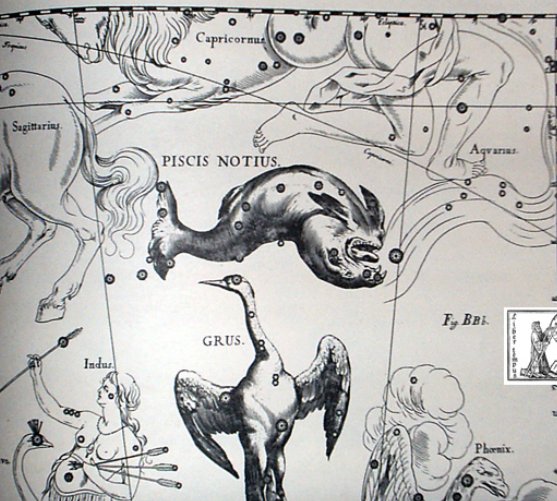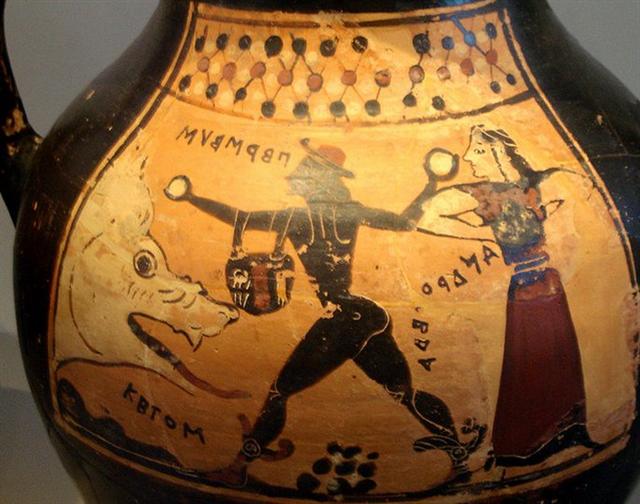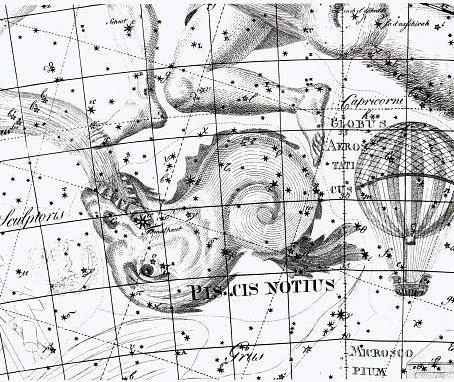87. This beautiful system of ideas was inherited from the ancients, and a glimpse of its complicated whole (implex) could only be imagined after years of study. ... 'From now on', said Father Sun, grieving over Phaeton, his fallen child, 'you shall be Mink'.
What meaning can this have for us? For such an understanding between men and men, and other living creatures too, we would need the kind of help King Arthur had at hand: 'Gwryr Interpreter of Tongues, it is meet that thou escort us on this quest. All tongues hast thou, and then canst speak all languages of men, with some of the birds and beasts.' This ability was also attributed to Merlin and Gwyon, those masters of cosmological wisdom whose names resound through the legends of the Middle Ages. In general, all fabulous communication was conceived as having such a range, not merely the Aesopian fable with is flat, all-too-wordly wisdom .... ... in a Cosmos everything had to be in perfect order. In order for the whole to be beautiful every item had to be in its proper place compared to the rest. Everything should reflect everything else, everything should imply the complete - it should be a hologram, an 'implex', a work of musicians. Otherwise it would be insignificant, not noteworthy, ugly and not to be remembered ...
It was essential not to forget or change anything: ... In the Gospel of Mark III.17, the 'twins' James and John, the sons of Zebedee, are given by Jesus the name of Boanerges, which the Evangelist explains as meaning 'Sons of Thunder'. This was long overlooked but eventually became the title of a work by a distinguished scholar, too soon forgotten, Rendel Harris. Here the Thunder Twins were shown to exist in cultures as different as Greece, Scandinavia and Peru. They call to mind the roles of Magni and Modi, not actually called twins, but successors of Thor, in Ragnarok. But to quote from Harris: We have shown that it does not necessarily follow that when the parenthood of the Thunder is recognized, it necessarily extends to both of the twins. The Dioscuri may be called unitedly, Sons of Zeus; but a closer investigation shows conclusively that there was a tendency in the early Greek cults to regard one twin as of divine parentage, and the other of human. Thus Castor is credited to Tyndareus, Pollux to Zeus ... The extra child made the trouble, and was credited to an outside source. Only later will the difficulty of discrimination lead to the recognition of both as Sky-boys or Thunder-boys. An instance from a remote civilization will show that this is the right view to take. For example, Arriaga, in his 'Extirpation of Idolatry in Peru' tells us that 'when two children are produced at one birth, which they call Chuchos or Curi, and in el Cuzco Taqui Hua-hua, they hold it for an impious and abominable occurrence, and they say, that one of them is the child of the Lightning, and require a severe penance, as if they had committed a great sin'. And it is interesting to note that when the Peruvians, of whom Arriaga speaks, became Christians, they replaced the name of Son of Thunder, given to one of the twins, by the name of Santiago, having learnt from their Spanish (missionary) teachers that St. James (Santiago) and St. John had been called Sons of Thunder by our Lord, a phrase which these Peruvian Indians seem to have understood, where the great commentators of the Christian Church had missed the meaning ... Another curious and somewhat similar transfer of the language of the Marcan story in the folk-lore of a people, distant both in time and place ... will be found, even at the present day, amongst the Danes ... Besides the conventional flint axes and celts, which commonly pass as thunder-missiles all over the world, the Danes regard the fossil sea-urchin as a thunderstone, and give it a peculiar name. Such stones are named in Salling, sebedaei-stones, s'bedaei; in North Salling they are called sepadeie-stones. In Norbaek, in the district of Viborg, the peasantry called them Zebedee stones! At Jebjerg, in the parish of Cerum, district of Randers, they called them sebedei-stones ... The name that is given to these thunderstones is, therefore, very well established, and it seems certain that it is derived from the reference to the Sons of Zebedee in the Gospel as sons of Thunder. The Danish peasant, like the Peruvian savage, recognised at once what was meant by Boanerges, and called his thunderstone after its patron saint ... This might have given pause to later hyperscholars like Bultmann, before they proceeded to 'de-mythologize' the Bible. One never knows what one treads underfoot ...
Manuscript E is packed full with names. ... Ira asked Makoi the following question: 'How did you fare when you wandered, when you went searching, when you found yourself on the path of the dream soul of the father?' Makoi replied, 'There are indeed all those places. I did not forget them at all (? kai viri kai viri) when I saw them (text corrected, i-ui-nei). I alone saw no fewer than four of my places, and I returned here only because night was falling'. Then Ira spoke again: 'How did you name them, last-born [hangupotu]?' Makoi replied, 'This is what happened, this is how I gave the names. I wrote (ta [?]) 'Te Manavai A Hau Maka' on the surface of a banana leaf (kaka), and this is how I left it'. This is how Makoi remembered it. No sooner had he said this, when Ira grew angry and quarreled [he kakai] with Makoi. He said the following (to him): 'You did not pay attention, last-born, and you did not [tae] give the (full) name. This is how it should be [Penei]: the Manavai of Hau Maka of Hiva, in memory (mo aringa ora) of the father, of his dream soul'. Makoi replied, 'In Hiva the land belongs to him - the land here is mine, not his [tae oona]!' [E:21] ... You are the one who shall stay here. We, on the other hand, have to turn around. Makoi replied, All right with me! Then Ira continued to speak to Makoi: Tomorrow, when it grows light, set out and name the places beginning with Apina. Makoi replied, How shall I give the names? Again Ira spoke, In Hiva are the names that are to be taken to name (the places of the new land). It grew light and Makoi got up. He set out and came to Apina. When he arrived there, he gave the name This is Apina Iti, this is Rapa Kura. He went on and came to Hanga O Ua. He gave the name This is Hanga O Ua of the Beautiful Wave (vave renga). Makoi went on, giving names, until he had made a (complete) circle around both sides (of the island). In Apina Nui a stone (maea) was erected, saying that the naming was done on a (round) trip during a single day ... [E:37] In the G text we have located the Full Moon (nakshatra place) defined from 183 days after April 25 (115), to be in October 25 at glyph number 108 on side b of the tablet - when in the night Fomalhaut culminated. Po. 1. Night; to get dark, to fall (of night): he-po, it is getting dark. Formerly used, with or without raá, in the meaning of a whole day: po tahi, one day; katahi te kauatu marima po, fifteen days; po tahi raá, first day of the week; po rua raá, po toru raá, second, third day, etc. 2. Alone or as po nui, used to express the idea of good luck, happiness. He-avai-atu au to'ou po, I wish you good luck (when taking leave of someone). Very common was this parting formula: aná po noho ki a koe! good luck to you! Po-á, morning; i te po-á, in the morning; i te po-era-á, very early in the morning. Po-ará, quickly, rapidly, swiftly: he-iri po-ará, go up quick; he-ta'o itau umu era po-ará, he cooked it quickly. Po-e-mahina, formerly used of sleep-walkers (haha a po). Vanaga. 1. Darkness, night, late; po haha, dark night, gloom. P Tu. po-tagotago, darkness. Mgv., Mq., Ta.: po, darkness, night. 2. Calendar day; po e rua, Tuesday; po o te tagata, life. P Pau., Mgv., Mq., Ta.: po, calendar day. Churchill.
... On the fifteenth day of the month of October (tangaroa uri), Nonoma left the house [he ea mai roto i te hare] during the night [i te po] to urinate outdoors [ki kaho.mimi].
At this point Ira called out [he rangi] to Nonoma, 'Look at the canoe!' Nonoma ran [he tahuti], he quickly went to Te Hiringa Heru (a ravine in the side of the crater Rano Kau) and looked around. There he saw the double canoe way out near the (offshore) islets [i te motu o haho], and the two (hulls of the canoe) were lashed together ... [E:75] ... There was no water in the village. The lakes and rivers were dry. Raven and Crow, two young girls who were having their first menstrual courses, were told to go and draw water from the ocean. Finding the journey too long, Raven decided just to urinate into her basket-bucket. She decieved no one and was severly scolded. Crow returned much later but with drinking water. As a punishment, Raven was condemned never to find water in the summer; only in winter would she find something to drink. For that reason the Raven never drinks during the hot months; she speaks with a raucous voice because of her dry throat ...
In this perspective it is possible to read Gb4-17 (108) as an allusion to APRIL 17:
|
||||||||||||||||||||||||||||||||||||||||||||||||||||||||||||||||||||||||||||||||||||||||||||||||||||||||||||||||||||||||||||||||||||||
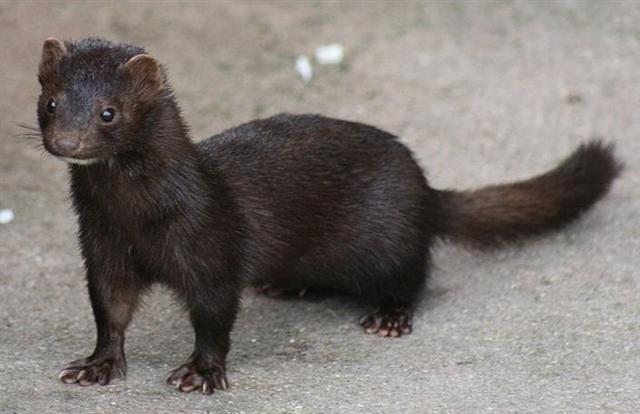
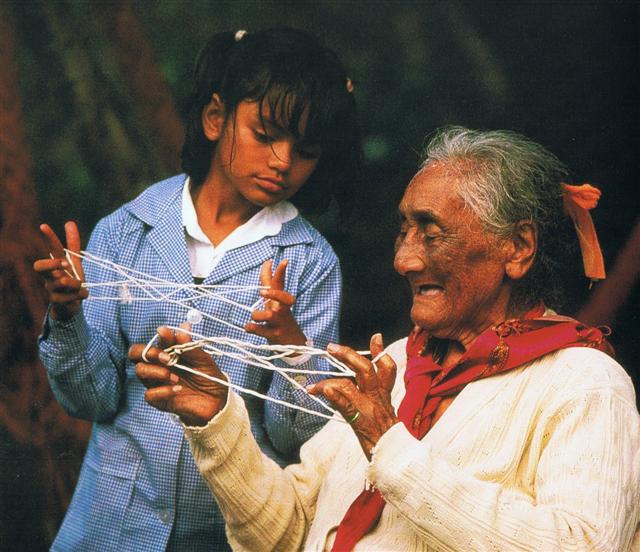 .
.
